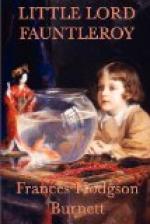He was very silent as they rode home. He felt it to be almost incredible that he who had never really loved any one in his life, should find himself growing so fond of this little fellow,—as without doubt he was. At first he had only been pleased and proud of Cedric’s beauty and bravery, but there was something more than pride in his feeling now. He laughed a grim, dry laugh all to himself sometimes, when he thought how he liked to have the boy near him, how he liked to hear his voice, and how in secret he really wished to be liked and thought well of by his small grandson.
“I’m an old fellow in my dotage, and I have nothing else to think of,” he would say to himself; and yet he knew it was not that altogether. And if he had allowed himself to admit the truth, he would perhaps have found himself obliged to own that the very things which attracted him, in spite of himself, were the qualities he had never possessed—the frank, true, kindly nature, the affectionate trustfulness which could never think evil.
It was only about a week after that ride when, after a visit to his mother, Fauntleroy came into the library with a troubled, thoughtful face. He sat down in that high-backed chair in which he had sat on the evening of his arrival, and for a while he looked at the embers on the hearth. The Earl watched him in silence, wondering what was coming. It was evident that Cedric had something on his mind. At last he looked up. “Does Newick know all about the people?” he asked.
“It is his business to know about them,” said his lordship. “Been neglecting it—has he?”
Contradictory as it may seem, there was nothing which entertained and edified him more than the little fellow’s interest in his tenantry. He had never taken any interest in them himself, but it pleased him well enough that, with all his childish habits of thought and in the midst of all his childish amusements and high spirits, there should be such a quaint seriousness working in the curly head.
“There is a place,” said Fauntleroy, looking up at him with wide-open, horror-stricken eye—“Dearest has seen it; it is at the other end of the village. The houses are close together, and almost falling down; you can scarcely breathe; and the people are so poor, and everything is dreadful! Often they have fever, and the children die; and it makes them wicked to live like that, and be so poor and miserable! It is worse than Michael and Bridget! The rain comes in at the roof! Dearest went to see a poor woman who lived there. She would not let me come near her until she had changed all her things. The tears ran down her cheeks when she told me about it!”
The tears had come into his own eyes, but he smiled through them.
“I told her you didn’t know, and I would tell you,” he said. He jumped down and came and leaned against the Earl’s chair. “You can make it all right,” he said, “just as you made it all right for Higgins. You always make it all right for everybody. I told her you would, and that Newick must have forgotten to tell you.”




